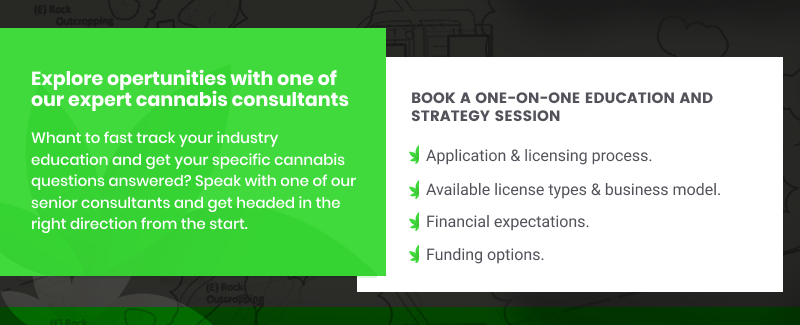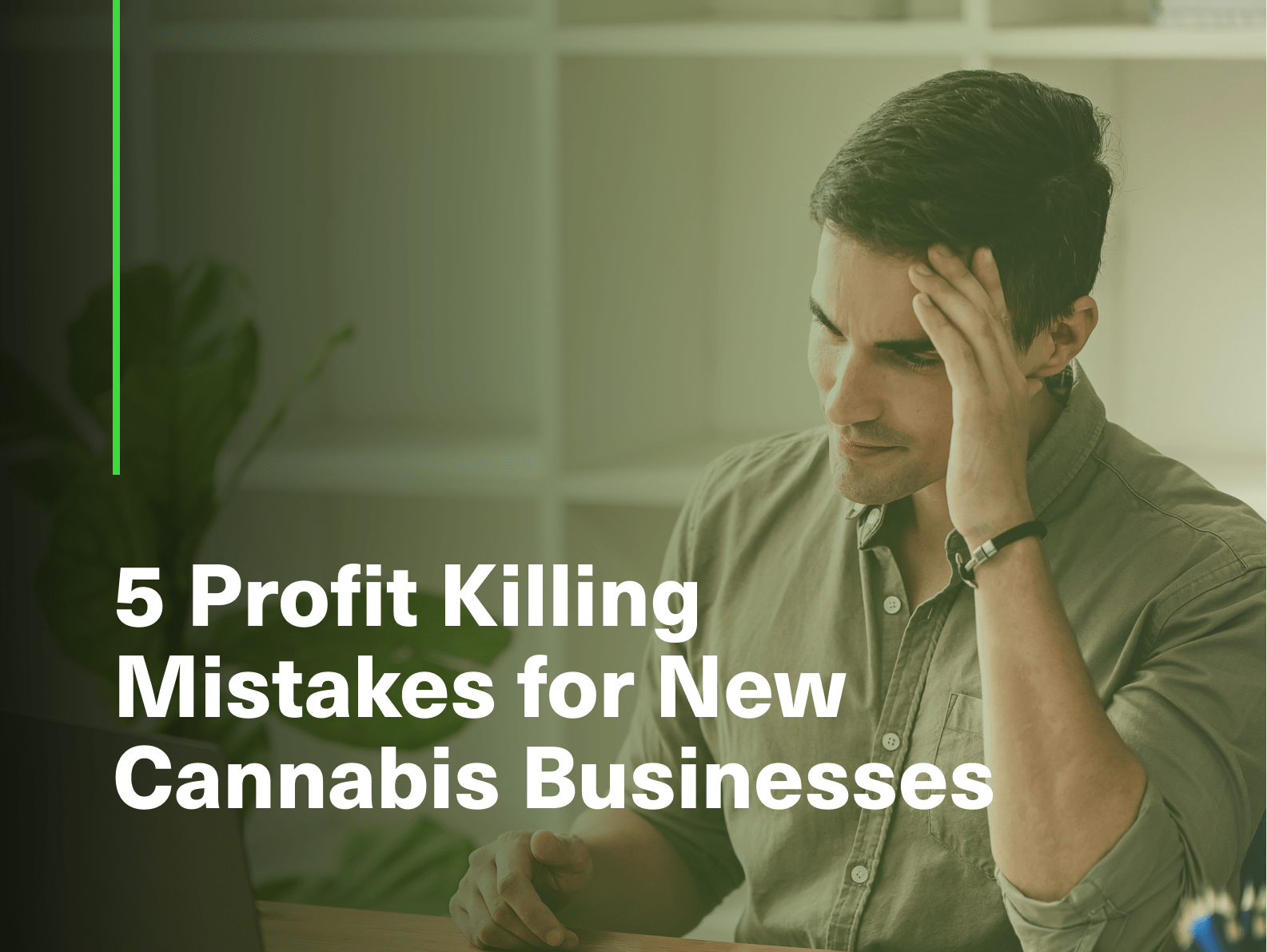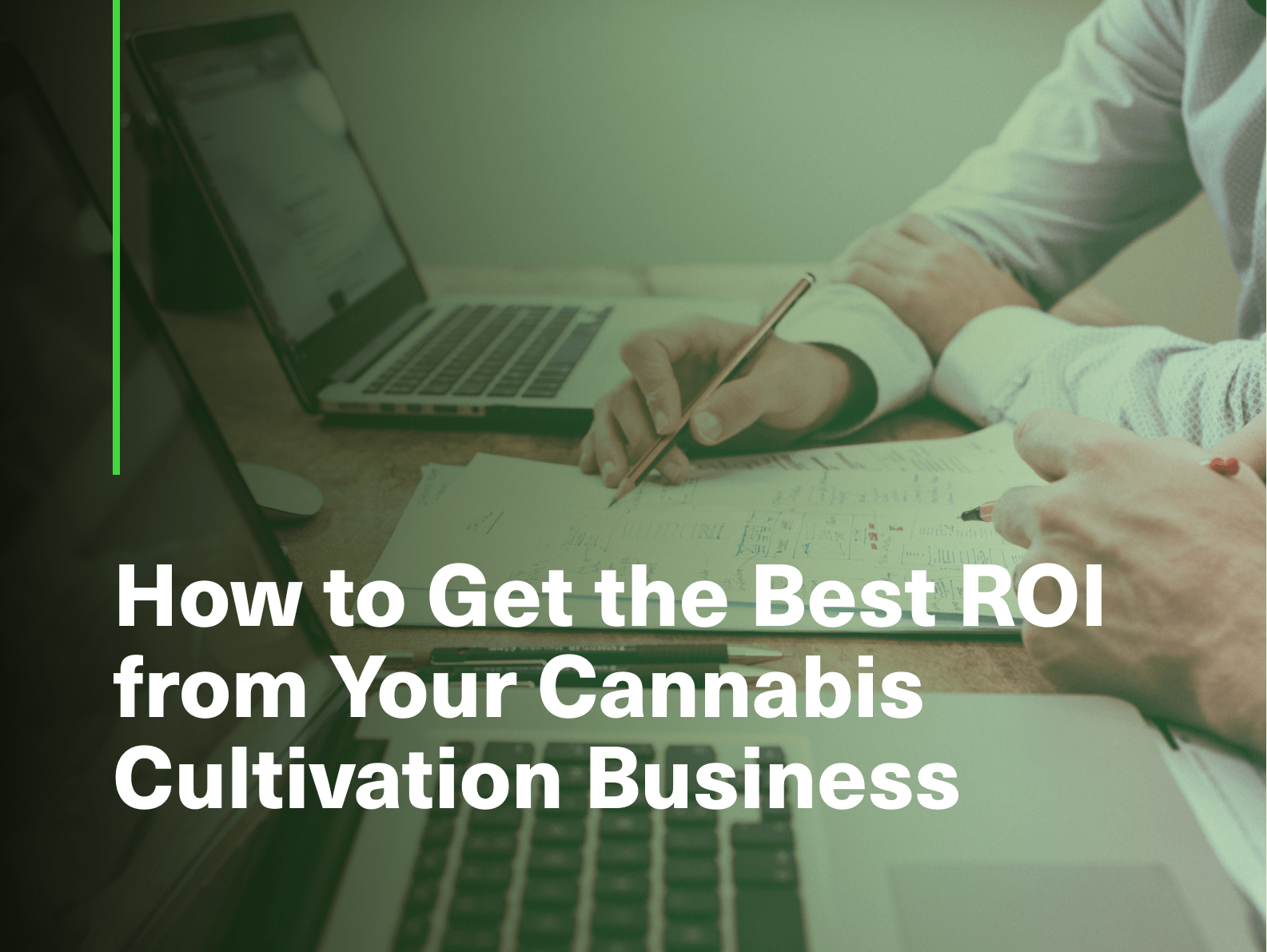There is significant regulation, restrictions, and even opposition paving the road on the journey to a cannabis operation. Since many of these hurdles revolve around where an entity “does business,” finding the right location can be a challenge.
Oftentimes, a property search will be conducted without up-to-date knowledge of the current cannabis regulations & restrictions (they are continually changing), which is crucial for ensuring the location won’t later be flagged, delayed, or even prohibited from operating.
Could your cannabis cultivation location be displacing a certain animal species or type of vegetation? Hard to know.
Hiring an expert is one of the most effective strategies for steering towards the right locations and away from the ones that could cause serious time and financial losses down the line.
At BeGreenLegal, we help new clients from ground zero with a property search. Our proven step-by-step process will assess your needs and locate the right property for your business.
This overview is intended for entities:
- Starting a new cannabis business
- Looking for a property for a new cannabis business
- Looking for a buyer/leaser for your property
- A commercial or residential agent who regularly encounters buying and selling opportunities for cannabis property
Here’s how to acquire cannabis real estate in California (the right way):
STEP #1: ESTABLISH A BASIC BUSINESS STRATEGY
Your business strategy, or work plan, is a master outline for the success of your business.
Every cannabis business needs one, but unfortunately lots of new cannabis entrepreneurs drop the ball here.
A shoddy work plan can lead to months of delays and tens of thousands of dollars in financial losses, and many of these errors are directly related to cannabis real estate selection.
Your work plan will answer important questions, like:
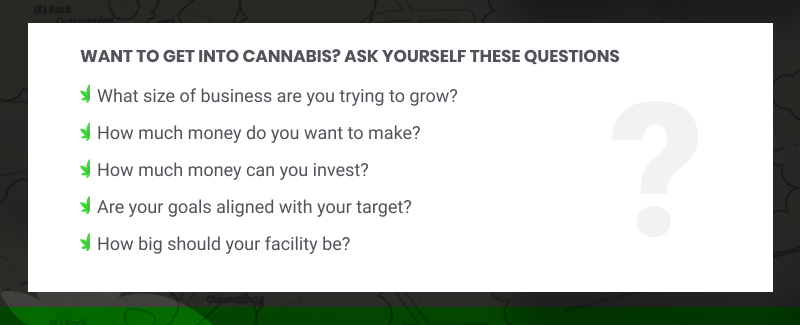
- What size of business are you trying to grow?
- How much money do you want to make?
- How much money can you invest?
- Are your goals aligned with your target?
- How big should your facility be?
These questions need to be answered before you start searching for property.
At this point all that’s left is to make sure that you have the funding in place and to determine a funding and scheduling plan.
After that, it’ll be time to start hunting for a piece of prime cannabis real estate.
STEP #2: SEARCH FOR SUITABLE CITIES AND COUNTIES
The next step is to look for eligible cities and counties. We can help in a number of ways:
- Connect you with a qualified commercial agent in your area
- Support your contracted agent throughout the process
- Leverage a BeGreenLegal in house agent
First, we will identify regions of California that are suitable for the type of business you’re trying to start. This list might end up having only one city and county, or 10+, it just depends on the area you want to work in.
The Emerald Triangle of Northern California is ideal for cultivation, but it has few retail opportunities. A lot of companies choose to conduct cultivation and manufacturing operations in the countryside and establish retail stores in cities like San Diego and Los Angeles where the demand is higher.
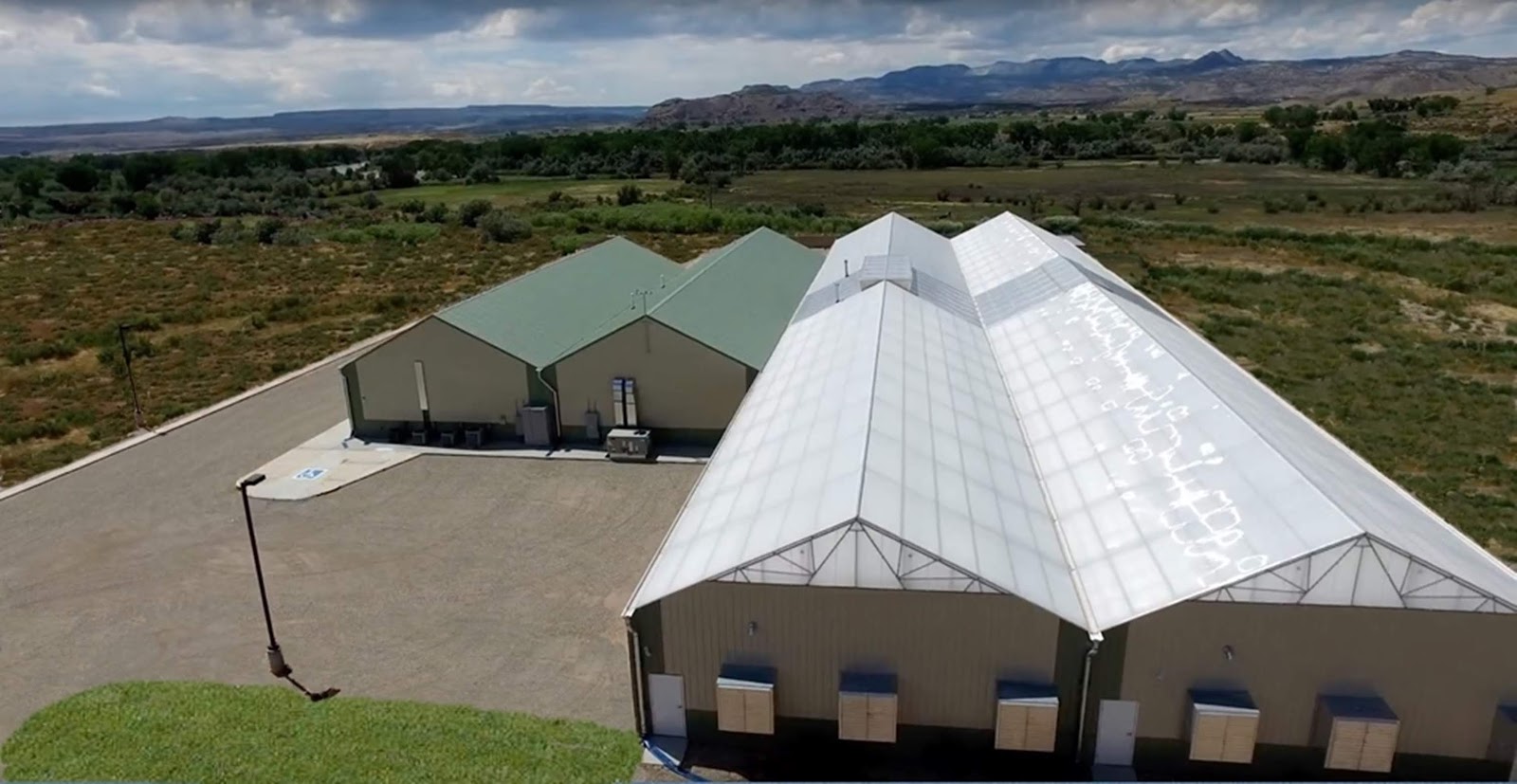
Storefront retail space is the hardest land to acquire because the application process has such a short time window and there are limited slots (sometimes as few as 5 operators/properties at a time). They run out of licenses quickly, so if you miss the window you could be out of luck.
Some regions even require that the owner establish residency for a certain number of years before being allowed to own cannabis real estate.
At BeGreenLegal, we streamline the process. Most areas are quickly eliminated, and the ones that remain are added a list of front runners for you to look over.
STEP #3: IDENTIFY PARCELS THAT HAVE THE RIGHT ZONING
At BeGreenLegal, we identify suitability first and availability second.
Once we’ve identified eligible cities and counties, we look for parcels within those cities and counties that have the right zoning.
We then filter them according to the types of cannabis licenses that they allow, and end up with a map of potentially suitable properties.
Last but not least, we match those properties with real estate listings to find out what is actually for sale.
This narrowing-down process takes into account common obstacles, like sensitive use buffers and environmental restrictions.
Now you have a list of the most valuable parcels, it’s time to get some boots on the ground and go check them out…
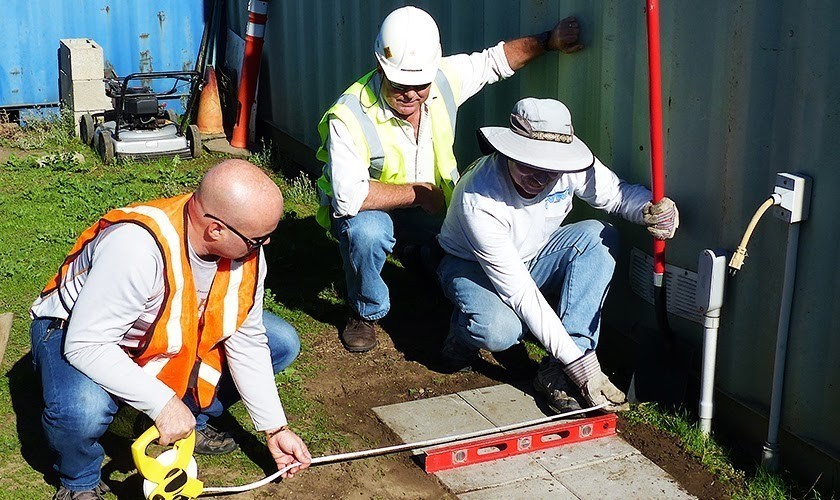
STEP #4: PHYSICALLY CHECK THE PROPERTIES OUT
Once we have a shortlist of properties, we work with the agent to inspect them for suitability.
A property suitability assessment provides a deep analysis of each element of the property, including how it gels with your work plans. It also involves collecting the survey data necessary to produce a detailed facilities plan.
Our surveyors use precise GPS scanning instruments to create accurate base maps and 3D models, including locating every aspect of the property, like:
- Property corners
- Parking lots
- Access roads
- Walkways
- Trees
- Bodies of water
- Other environmental features
Once you have an accurate base map, you’ll have everything you need to compare and contrast properties.
With cannabis real estate, you never know what you’re dealing with until you actually get out there and take a look.
Will it be any easy application or a hard one? Should you even pursue it?
Aside from the actual cost of the property, the next most important factor is neighborhood compatibility.
You may think that you have a viable property, only to find that a nearby park or daycare facility disqualifies it.
At BeGreenLegal, we take the necessary “extra steps” and walk door-to-door to confirm that a property is at least 600 ft away from all schools, parks, daycares and youth centers.
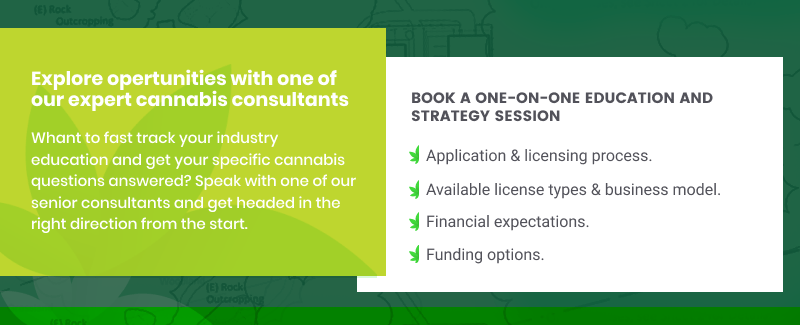
STEP #5: SUBMIT AN OFFER TO THE SELLER
Now that all the hard work’s done, it’s time to submit an offer to the seller.
You may have to negotiate back and forth a few times, but if they agree you’ll be able to move forward and get a purchase agreement in place.
Don’t worry, your cannabis real estate consultant or agent will vet all of the aspects of the property deal.
On average, the entire process of finding a piece of cannabis real estate takes 3 to 6 months, and crucial licensing windows can be as short as 1.5 to 3 months. For example, the city of Chico might announce an application window from March to June on very short notice. This makes it extremely important to have a cannabis expert keeping close tabs on the situation.
BeGreenLegal’s team will provide updates on a weekly basis as opportunities arise, and chances are within a few short months later you’ll be signing the paperwork for a new piece of property.
AN ADDITIONAL CONSIDERATION FOR ENTITIES THAT MAY VERTICALLY INTEGRATE
If the business is going to potentially own multiple phases in the supply chain, there are other considerations when choosing a property:
#1 Logistics- Consider how your different businesses will need to interact with each other. Do they need to be on the same site? Will they need to be near each other to ensure efficiency?
#2 Scale- Consider how the tertiary business can independently grow profitability and plan your space accordingly. Oftentimes an entity will vertically integrate to better support the profitability of the primary business type, not considering how it can be a profit center on its own. For example, a cultivator will also distribute in order to avoid profit bleeds at the wholesale level, but will not consider how that distribution business can be positioned to bring on other lines to be a proper distributor. Healthy vertical integration not only better controls the supply chain and protects margins, but it maximizes profitability within each business type.
The five phases of the cannabis supply chain:
- Dispensaries: Retail stores
- Testing: Quality-control services
- Distribution: Supply chain management
- Cultivation: Producing raw flower and biomass
- Manufacturing: Extraction, infusion, and packaging
Understanding how these stages fit together will allow you to build a vertically integrated business and maximize revenue.
Even if you want to initially focus only on cultivation, you should consider a property that will allow you to expand into areas like manufacturing and distribution later on.
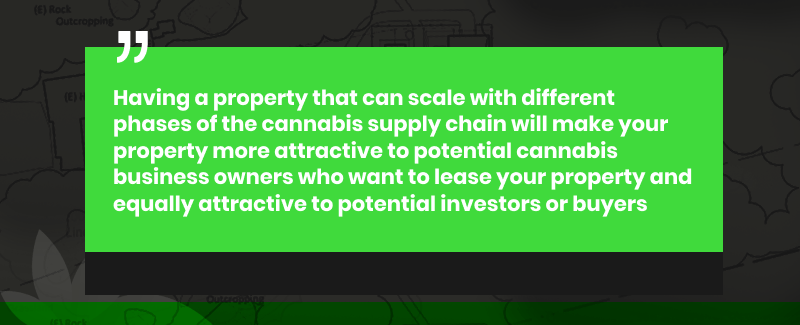
California regulators have created what’s called a Type 12 Microbusiness, which allows you to create a complete farm-to-table experience. In order to qualify, you have to fit the output requirements of a medium-sized grow and operate in a facility with a 10,000 sq ft cap on canopy space. These details need to be taken into consideration while you’re property hunting.
There’s a lot to consider, and hiring a cannabis real estate consultant is the best way to sort through it all.
MAJOR OBSTACLES OF ACQUIRING CANNABIS REAL ESTATE
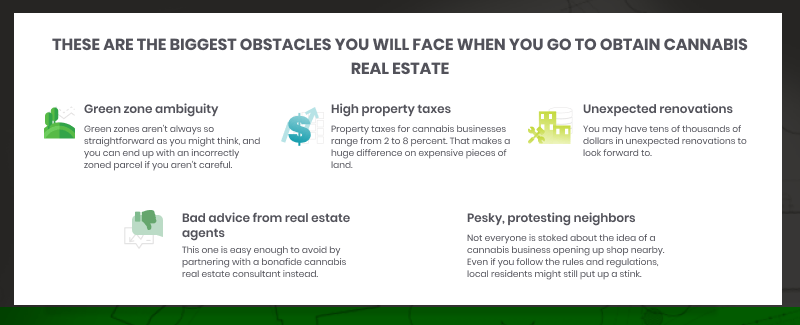
Here’s a quick recap of some of the biggest obstacles you may face while searching for cannabis real estate in California:
- Green zone ambiguity: Green zones aren’t always so straightforward as you might think, and you can end up with an incorrectly zoned parcel if you aren’t careful.
- High property taxes: Property taxes for cannabis businesses range from 2 to 8 percent. That makes a huge difference on expensive pieces of land.
- Unexpected renovations: You may have tens of thousands of dollars in unexpected renovations to look forward to.
- Bad advice from real estate agents: This one is easy enough to avoid by partnering with a bonafide cannabis real estate consultant instead.
- Pesky, protesting neighbors: Not everyone is stoked about the idea of a cannabis business opening up a shop nearby. Even if you follow the rules and regulations, local residents might still put up a stink.
ARE YOU READY TO FIND A LOCATION FOR YOUR CANNABIS BUSINESS?
BeGreenLegal’s team of licensed cannabis real estate consultants and GIS experts can help you navigate the entire property search and acquisition process.
We’ll even help you develop a solid work plan and obtain all the necessary licenses.
Contact our team today to find out more about our Property Search & Compatibility Package, including…
- Opportunity analysis
- City & county compatibility
- Parcel analysis
- Property acquisition
The bottom line is, finding a viable cannabis location is a lot more complex than opening any other type of business, but don’t worry, we’ll be with you every step of the way.
